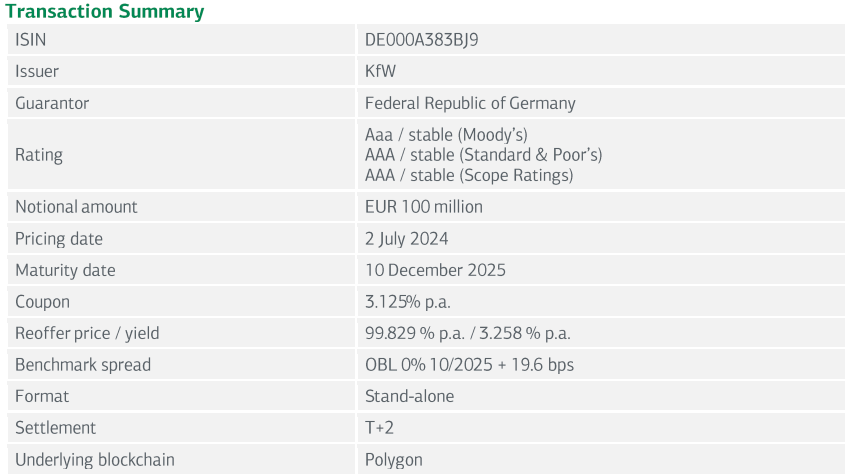Last updated:
 Why Trust Cryptonews
Why Trust Cryptonews

Germany’s largest state-owned development bank Kreditanstalt für Wiederaufbau (KfW) has partnered with Boerse Stuttgart Digital, the digital asset brand of the Boerse Stuttgart exchange group, for its new blockchain-based digital bond.
According to the exchange’s August 12 announcement, Boerse Stuttgart Digital will provide wallet management and private key security services for the bond issuance and redemption process. The bond, scheduled for issuance in the coming weeks, will comply with Germany’s Electronic Securities Act (eWpG).
Driving Digitisation Initiatives with ECB
The bond issuance will also see both KfW and Boerse Stuttgart Digital participating in the European Central Bank’s (ECB) trials for settling blockchain-based financial transactions using central bank digital currency (CBDC). In June 2024, Boerse Stuttgart Digital successfully secured a spot in the second wave of these EU-wide tests, where it will also manage wallets and protect private keys.
“As one of the world’s largest and most active bond issuers, we are actively driving digitisation initiatives in the issuing and settlement process”, said Gaetano Panno, head of transaction management at KfW.
“The utilization of new technologies as part of the ECB trials enables us to technically process a “delivery vs. payment” transaction and thus supports our digital learning journey”.
First Blockchain-Based Bond in Germany
Since 2022, KfW has been actively pursuing digitization initiatives, which can be surprising for a state-owned bank traditionally associated with more conservative financial practices. Positioned as a pioneer in the issuance of blockchain-based bonds, KfW issued a €100 million digital bond in the form of a crypto security on the Polygon (MATIC) blockchain with a maturity date of December 10, 2025, and a coupon of 3.125% in July 2024. This transaction marked the first syndicated blockchain-based digital bond in Germany.

A consortium of leading German banks, including DZ Bank, LBBW, Deutsche Bank, and Bankhaus Metzler, acted as bookrunners for the bond. This broad syndicate ensured participation from cooperative banks, public banks, and private commercial banks – three pillars of the German banking system. Anchor investors such as Berliner Volksbank, Deka Bank, and Union Investment also contributed significantly to the bond’s success.
“Digitalisation of the financial industry plays a crucial role in the international competitiveness of the European financial market,” said Melanie Kehr, Member of the Executive Board of KfW Group. “One of our most important goals is to make an active contribution to the development of the market for digital securities in Germany and Europe”.
Bundesbank Tech for Digital Bonds
For their next bond for ECB trials, KfW and Boerse Stuttgart Digital will leverage the so-called “Trigger Solution,” a technical solution developed by the Bundesbank, Germany’s central bank, that connects blockchain-based systems with traditional payment systems. This solution enables a seamless connection between blockchain-based securities platforms and established European payment systems such as Target2. As a result, digital securities, such as digital bonds, can be processed efficiently and securely.
Other leading financial institutions, including Clearstream, Deka Bank, and DZ Bank, have already successfully implemented the Bundesbank solution, demonstrating the growing interest of the financial industry in such interoperable systems.


















